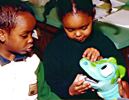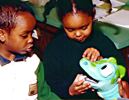Using Positive Reinforcement for High-Need Children

Check out our blog for social-emotional learning articles, news, and more!

 Christopher is a very active, outspoken 4 year old. He frequently engages in aggressive behavior and verbal outbursts, and to outside observers he looks angry most of the time...
Christopher is a very active, outspoken 4 year old. He frequently engages in aggressive behavior and verbal outbursts, and to outside observers he looks angry most of the time...
This article describes an evidence-based intervention that was designed to increase children?s social and emotional competence, decrease problem behaviors, and increase academic competence. The Incredible Years Dinosaur School Social Skills and Problem Solving curriculum (Webster- Stratton, 1990, Webster-Stratton & Reid, 2003) has been shown in two randomized control group trials to decrease aggression and promote social skills in young children (Webster-Stratton & Hammond, 1997; Webster-Stratton, Reid & Hammond, 2001b). Originally designed as a small group treatment for children diagnosed with Oppositional Defiant Disorder or Conduct Disorder, a revention/intervention classroom-based version of this curriculum has recently been evaluated for all children (ages 3-8 years) targeting high-risk populations. Findings from a randomized, control group intervention study in 160 classrooms (including Head Start and kindergarten classes) with 1746 children indicated that classrooms who offered the Dinosaur School program had teachers who were significantly more nurturing and consistent with discipline, focused more on promoting social and emotional behaviors and were less harsh and critical in their interactions with children. Compared with control classrooms, children in intervention classrooms where the Dinosaur Curriculum was delivered were more cooperative with teachers and peers, were observed to do more problem solving and had higher cognitive and school readiness scores (Webster-Stratton & Reid, 2006). Additionally, a pilot study was conducted investigating the effectiveness of this intervention for use with children with special needs, including Autism Spectrum Disorders. Results included increasing the receptive and expressive feeling word vocabulary, increasing appropriate and prosocial responses to interpersonal problem situations, as well as increasing engagement during large group circle times (Joseph & Strain, 2004).





